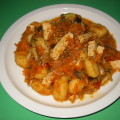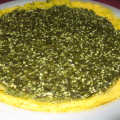 Hemp or Cannabis Sativa is a tall, vigorous annual that has been grown and used throughout history. Its closest relative is the hops plant. Hemp has many benefits to us all and is kind to the planet. Used as a strong, yet soft fabric, a substitute to virgin tree pulp in paper, an alternative to petrochemicals in plastics, an option as a fuel source, a moisturizing cosmetic, a healing drug and a nutritional food, hemp has almost unlimited uses. Here, we shall be concerned only with the fruit of the plant- the hemp seed.
Hemp or Cannabis Sativa is a tall, vigorous annual that has been grown and used throughout history. Its closest relative is the hops plant. Hemp has many benefits to us all and is kind to the planet. Used as a strong, yet soft fabric, a substitute to virgin tree pulp in paper, an alternative to petrochemicals in plastics, an option as a fuel source, a moisturizing cosmetic, a healing drug and a nutritional food, hemp has almost unlimited uses. Here, we shall be concerned only with the fruit of the plant- the hemp seed.
 The Chinese were eating hempseed as long as 8000 years ago. Even George Washington and Thomas Jefferson grew hemp on their plantations and Queen Victoria was prescribed hemp as medicine. Today’s we consumers are turning to hempseed for its many health benefits and pleasant nutty flavor.
The Chinese were eating hempseed as long as 8000 years ago. Even George Washington and Thomas Jefferson grew hemp on their plantations and Queen Victoria was prescribed hemp as medicine. Today’s we consumers are turning to hempseed for its many health benefits and pleasant nutty flavor.
For vegans, a good source of plant based protein is necessary. Hulled hemp seed is 33% protein. Sixty five percent of this protein content found in hemp is called “edestin”, a globulin protein. This is the highest percentage of this high quality protein found in the plant kingdom. Proteins are the building blocks for every cell in our body. Edestin proteins are pre-cursors to such vital bodily components as hormones, hemoglobin (transports oxygen and carbon dioxide); enzymes that control many biochemical reactions; and antibodies which fight off invading bacteria, viruses and toxins. Edestin protein is not only very digestible- but it actually facilitates digestion as well as helping suppress symptoms of sickness from setting in.
Hemp seed also contains the amino acids (in it’s protein) useful for childhood growth as well as all eight essential amino acids (see chart) that are mostly superior, if not comparable to levels found in soy protein isolate or flax seed. The protein in hemp is also high in Methionine and there is an absence of trypsin inhibitory activity that is an advantage over the type of protein found in soybean (hemp does not cause flatulence). Hemp seed may be useful for persons with stressful lifestyles due to its Glutamic acid content.
There is now a variety of hemp protein supplements available on the market. These vegan protein supplements contain all these nutritional benefits and contain from 34-70% protein content. A valuable addition to any meal.
Hemp seed is also high in dietary fiber at 35%. Insoluble fiber helps prevent constipation and water-soluble fiber helps maintain blood glucose levels and lower blood cholesterol levels. It has been shown that people who consume a high fiber diet have less risk of cancer of the breast and prostate due to assistance in lowering blood levels of lipids and some hormones.
Possibly the major nutritional benefit of hemp seed is the mix of essential fatty acid’s (EFA’s). For vegans, Essential Fatty Acids have traditionally been not so easy to find with the most popular sources being from fish oils. Hemp seeds and hemp oil can help here. Over 75% of the fatty acids found in hemp are polyunsaturated. Hemp seed contains the highest plant based concentration found on the planet of Omega-6 and Omega-3 Essential Fatty Acid’s. It is now more widely understood that these fats are not all bad, quite the opposite. These fats are so called essential because they are needed by the body but cannot be produced within the body. They have to be ingested via food such as hemp seed based products. The ratio of these EFA’s is 3:1, a balance considered to be ideal for human consumption.
This vegan source of Omega-3 (LNA) has been shown to protect against certain types of cancers, modify immune and inflammatory reactions. They have also demonstrated the following benefits: renal, respiratory, cardiovascular, and dermatological. Omega-6 (LA) may help prevent skin problems such as acne, loss of hair, poor blood circulation, liver and kidney problems, gallbladder problems and cardiovascular disease. Authorities recommend that pregnant and lactating women should increase their Omega-3 LNA intake. EFA’s are required for maintaining the structure of cell membranes and the permeability of the skin. Hemp seed also contains 2-4% Omega-6 gamma-Linoleic acid (GLA). GLA is often found in more exotic and expensive oils. The benefits attributed to GLA include relief of premenstrual syndrome and use in chronic skin diseases and neurodermatitis.
As with all quality oils, hemp oil is recommended to be cold-pressed, sealed in a dark bottle and stored refrigerated.
Hulled hemp seeds are a regular addition to any vegan meal. For hundreds of free recipes you can download the free vegan recipes at www.hempfoods.com.au
Treated by farmers as a similar crop to flax, industrial hemp contains very little (0.3% or less) of the drug Tetrahydracanibinol (THC). You would have to smoke a field of it to get high.
Author: Paul Benhaim
Bio: Author of 11 books on industrial hemp (see www.hempowered.com), founder of Hemp Foods Australia (www.hempfoods.com.au) and the world’s first open hemp farm (www.hempfarm.com.au)






2 Comments
Chia (324 comments)
June 23, 2011 at 12:41 amMy family members eats hemp seeds all the time. In fact, I buy bulk and freeze some.
We sprinkle hemp seeds on salads, steam veggies, and tofu. Sometimes my 3 year old daughter likes to eat them straight up.
I also buy hemp oil, and use it over salads, cooked veggies, rice, and quinoa. Very delicious.
My husband uses hemp protein powder in his smoothies.
Here’s my recipe for 1 tall glass of hemp milk.
– handful of shelled hemp seeds
– pitted dates soaked in water until soft
– spring or filtered water
– optional pinch of vanilla bean powder
Blend ingredients in a blender until content is smooth. Add more water as needed until desired consistency. It’s delish.
rbchurst (1 comments)
August 25, 2011 at 12:08 pmThanks for the information! My friend eats hulled hemp seeds all the time and loves them. I haven’t had a lot of luck finding them in retail stores so I would love to buy some online. What is the best way to eat them? Plain? or can you roast them?